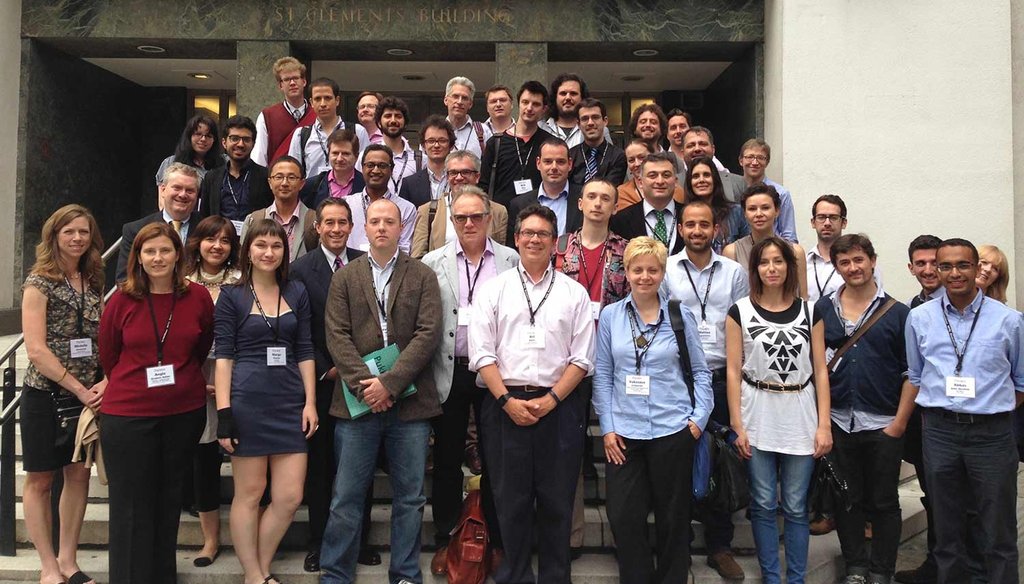Stand up for the facts!
Our only agenda is to publish the truth so you can be an informed participant in democracy.
We need your help.
I would like to contribute

Fact-checkers from around the world met in June for the Global Fact-checking Summit in London.
We last examined the global fact-checking movement a year ago, and since then we’ve noticed more fact-checkers seeking the truth in everyday politics -- in places like India, Ukraine and Argentina.
Earlier this year, FactChecker.in tracked elections in India, examining claims on employment, the economy and education.
The site also examined a repeated claim that Delhi was the "rape capital" of India; in fact, statistics show there are other cities where sexual assaults are reported more frequently.
Govindraj Ethiraj, the site’s founder, launched the fact-checking site as a companion to IndiaSpend.com, a public interest journalism initiative that uses data to tell stories.
Other sites have expanded beyond the traditional fact-check, incorporating activism and crowdsourcing.
In Ukraine, StopFake, started as a small blog and has grown to attract 50,000 viewers per day. The site specializes in debunking Russian propaganda and has detected Photoshopped images that purport to show actual events in Ukraine. The site also provides instructions for how readers can expose fraudulent photos and claims.
Full Fact, an initiative based in London, takes fact-checking a step further than simply debunking misinformation. The Full Fact team actively seeks out corrections from politicians and newspapers that make false claims.
Securing the correction is a way of measuring impact, said Will Moy, director of Full Fact.
Argentina’s fact-checking site, Chequeado, is experimenting with different forms of crowdsourcing to increase the availability of sources and data for fact-checking. Readers can contribute by posting and tweeting sources to the online platform DatoCHQ.
Chequeado released a video this year showing the process it uses to fact-check a live speech. It uses crowdsourcing to collect data prior to the event, and relies on volunteers to help fact-check in real time.
Another site with an extensive crowdsourcing platform is FactCheckEU, which fact-checked candidates for the European Parliament before elections in May. Statements were rated "True" to "Insane Whopper." Readers could submit statements to be fact-checked, offer their own fact-checks or translate a statement so others can fact-check it.
FactCheckEU has been in limbo since the election. A notification on the site reads, "The project is currently on hold while we explore new funding opportunities."
Sustainability was an important topic discussed at the inaugural Global Fact-Checking Summit held in June this year, organized by PolitiFact founder Bill Adair, now a professor at Duke University. More than 50 fact-checkers, including journalists from PolitiFact, gathered in London to discuss methods and compare ideas.
The Italian fact-checking site Pagella Politica takes a multifaceted approach to funding. Not only are the editors seeking to sell research and create customized reports for clients, but they also broaden their exposure by appearing in a weekly television segment on Channel Rai 2. Alexios Mantzarlis, co-founder of the site, prepares a fact-check each week to discuss with the show’s host and to debate with a panel -- giving the segment a flashy, entertainment factor that attracts 1 million viewers.
Sites are utilizing television to reach a broader audience, including Georgia’s GRASS Fact Check, Spain’s Prueba de Verificacion, and Australia’s ABC Fact Check.
More fact-checkers are also tracking campaign promises made by political candidates.
Several sites around the world have been modeled after PolitiFact’s Obameter, which follows the campaign promises of President Barack Obama. In Egypt, the Morsi Meter tracked the promises of President Mohamed Morsi and inspired the Rouhani Meter to monitor Iranian President Hassan Rouhani. In Australia, the ABC just launched its own Promise Tracker to follow the campaign promises of Tony Abbott and his Coalition government.
For Bosnia and Herzegovina’s Istinomjer, Darko Brkan says he is currently tracking a total of 1,600 promises made by politicians from every party.
At the meeting in London, fact-checkers agreed that an international association should be started to encourage communication.
"We all came away from the London conference with the realization that fact-checking has become a significant movement in journalism around the globe," Adair said. "We want to keep the conversation going, share best practices and encourage fact-checking in new places."
Our Sources
The 2014 Global Fact-checking Summit

























